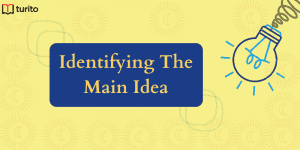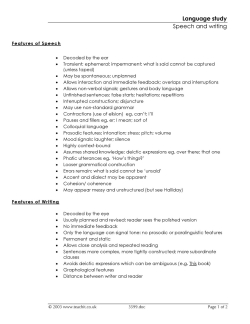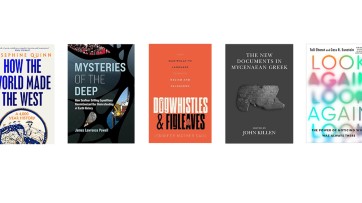

What are the Components and Features of Speech Writing?
Back to: Pedagogy of English- Unit 5
What are the Components and Features of Speech Writing?
Speech is an oral presentation of information or delivery of messages through the use of words of spoken words delivered in front of or to an audience who have gathered in a seminar, meeting, conference, or some other event. It is a form of oral communication which is the oldest method and also the most effective method of communication. Speech is considered to be one of the most effective ways of delivering a message in any event. A speaker can present his thoughts and opinions on various matters to a large group of audience through his or her speech. Due to its efficacy, it is widely used around the world. Be it for social purposes or religious purposes, a speech can come in handy for several kinds of events.
Features of speech writing
The various features of speech writing are as follows:
A speech is considered to be effective when it is clear and concise. The information presented in the speech should be comprehensible to the present audience and the speech should be delivered by the speaker in a fluent and eloquent manner.
Conciseness
Along with being clear, the message presented through the speech should also be concise so that the speech does not get tedious and does not get boring.
Definiteness
The subject matter presented through the speech should be relevant and definite to the present audience.
Interesting
Apart from being clear and concise, there is also a need for the speech to have an element of interest. This interest should not be limited to the subject matter but rather, the speech itself should be delivered in an engaging and interesting manner.
Audience-centered
The message of the speech should be centered more around the audience rather than the speaker himself or herself.
Speak Slowly
If the speaker speaks too fast, the listeners may lose track of the information being presented and hence, one must speak slowly but not too slowly so asn to put the listeners to sleep.
The information presented in the speech should not be biased and it should be presented from a neutral point of view.
Body Gestures
One should also maintain a proper posture and use appropriate body gestures to deliver the speech.
Ensure Participation Of Audience
Asking questions to the listeners or the audience and involving them is necessary.
Free From Emotions
The speaker should not dwell too much on his or her emotions to ensure that the speech can be delivered in an effective manner.
Components of speech writing
The components of speech writing are as follows:
Introduction
A speech should start with an introduction to the topic or the subject matter that is being presented in the speech. It should not last more than 1 to 2 minutes and it should be brief.
This section includes the main messages of the speech and should cover all the information that needs to be presented in the speech.
The conclusion should summarize the central ideas presented in the speech and give the speech a closure and a sense of completion. It should also be shorter than both the introduction and the body.
These are the various components and features of effective speech writing

Rice Speechwriting
Beginners guide to what is a speech writing, what is a speech writing: a beginner’s guide, what is the purpose of speech writing.
The purpose of speech writing is to craft a compelling and effective speech that conveys a specific message or idea to an audience. It involves writing a script that is well-structured, engaging, and tailored to the speaker’s delivery style and the audience’s needs.
Have you ever been called upon to deliver a speech and didn’t know where to start? Or maybe you’re looking to improve your public speaking skills and wondering how speech writing can help. Whatever the case may be, this beginner’s guide on speech writing is just what you need. In this blog, we will cover everything from understanding the art of speech writing to key elements of an effective speech. We will also discuss techniques for engaging speech writing, the role of audience analysis in speech writing, time and length considerations, and how to practice and rehearse your speech. By the end of this article, you will have a clear understanding of how speech writing can improve your public speaking skills and make you feel confident when delivering your next big presentation.
Understanding the Art of Speech Writing
Crafting a speech involves melding spoken and written language. Tailoring the speech to the audience and occasion is crucial, as is captivating the audience and evoking emotion. Effective speeches utilize rhetorical devices, anecdotes, and a conversational tone. Structuring the speech with a compelling opener, clear points, and a strong conclusion is imperative. Additionally, employing persuasive language and maintaining simplicity are essential elements. The University of North Carolina’s writing center greatly emphasizes the importance of using these techniques.
The Importance of Speech Writing
Crafting a persuasive and impactful speech is essential for reaching your audience effectively. A well-crafted speech incorporates a central idea, main point, and a thesis statement to engage the audience. Whether it’s for a large audience or different ways of public speaking, good speech writing ensures that your message resonates with the audience. Incorporating engaging visual aids, an impactful introduction, and a strong start are key features of a compelling speech. Embracing these elements sets the stage for a successful speech delivery.
The Role of a Speech Writer
A speechwriter holds the responsibility of composing speeches for various occasions and specific points, employing a speechwriting process that includes audience analysis for both the United States and New York audiences. This written text is essential for delivering impactful and persuasive messages, often serving as a good start to a great speech. Utilizing NLP terms like ‘short sentences’ and ‘persuasion’ enhances the content’s quality and relevance.
Key Elements of Effective Speech Writing
Balancing shorter sentences with longer ones is essential for crafting an engaging speech. Including subordinate clauses and personal stories caters to the target audience and adds persuasion. The speechwriting process, including the thesis statement and a compelling introduction, ensures the content captures the audience’s attention. Effective speech writing involves research and the generation of new ideas. Toastmasters International and the Writing Center at the University of North Carolina at Chapel Hill provide valuable resources for honing English and verbal skills.
Clarity and Purpose of the Speech
Achieving clarity, authenticity, and empathy defines a good speech. Whether to persuade, inform, or entertain, the purpose of a speech is crucial. It involves crafting persuasive content with rich vocabulary and clear repetition. Successful speechwriting demands a thorough understanding of the audience and a compelling introduction. Balancing short and long sentences is essential for holding the audience’s attention. This process is a fusion of linguistics, psychology, and rhetoric, making it an art form with a powerful impact.
Identifying Target Audience
Tailoring the speechwriting process hinges on identifying the target audience. Their attention is integral to the persuasive content, requiring adaptation of the speechwriting process. A speechwriter conducts audience analysis to capture the audience’s attention, employing new york audience analysis methods. Ensuring a good introduction and adapting the writing process for the target audience are key features of a great speech. Effective speechwriters prioritize the audience’s attention to craft compelling and persuasive speeches.
Structuring Your Speech
The speechwriting process relies on a well-defined structure, crucial to both the speech’s content and the writing process. It encompasses a compelling introduction, an informative body, and a strong conclusion. This process serves as a foundation for effective speeches, guiding the speaker through a series of reasons and a persuasive speechwriting definition. Furthermore, the structure, coupled with audience analysis, is integral to delivering a great speech that resonates with the intended listeners.
The Process of Writing a Speech
Crafting a speech involves composing the opening line, developing key points, and ensuring a strong start. Effective speech writing follows a structured approach, incorporating rhetorical questions and a compelling introduction. A speechwriter’s process includes formulating a thesis statement, leveraging rhetorical questions, and establishing a good start. This process entails careful consideration of the audience, persuasive language, and engaging content. The University of North Carolina’s writing center emphasizes the significance of persuasion, clarity, and concise sentences in speechwriting.
Starting with a Compelling Opener
A speechwriting process commences with a captivating opening line and a strong introduction, incorporating the right words and rhetorical questions. The opening line serves as both an introduction and a persuasive speech, laying the foundation for a great speechwriting definition. Additionally, the structure of the speechwriting process, along with audience analysis, plays a crucial role in crafting an effective opening. Considering these elements is imperative when aiming to start a speech with a compelling opener.
Developing the Body of the Speech
Crafting the body of a speech involves conveying the main points with persuasion and precision. It’s essential to outline the speechwriting process, ensuring a clear and impactful message. The body serves as a structured series of reasons, guiding the audience through the content. Through the use of short sentences and clear language, the body of the speech engages the audience, maintaining their attention. Crafting the body involves the art of persuasion, using the power of words to deliver a compelling message.
Crafting a Strong Conclusion
Crafting a strong conclusion involves reflecting the main points of the speech and summarizing key ideas, leaving the audience with a memorable statement. It’s the final chance to leave a lasting impression and challenge the audience to take action or consider new perspectives. A good conclusion can make the speech memorable and impactful, using persuasion and English language effectively to drive the desired response from the audience. Toastmasters International emphasizes the importance of a strong conclusion in speechwriting for maximum impact.
Techniques for Engaging Speech Writing
Engage the audience’s attention using rhetorical questions. Create a connection through anecdotes and personal stories. Emphasize key points with rhetorical devices to capture the audience’s attention. Maintain interest by varying sentence structure and length. Use visual aids to complement the spoken word and enhance understanding. Incorporate NLP terms such as “short sentences,” “writing center,” and “persuasion” to create engaging and informative speech writing.
Keeping the Content Engaging
Captivating the audience’s attention requires a conversational tone, alliteration, and repetition for effect. A strong introduction sets the tone, while emotional appeals evoke responses. Resonating with the target audience ensures engagement. Utilize short sentences, incorporate persuasion, and vary sentence structure to maintain interest. Infuse the speech with NLP terms like “writing center”, “University of North Carolina”, and “Toastmasters International” to enhance its appeal. Engaging content captivates the audience and compels them to listen attentively.
Maintaining Simplicity and Clarity
To ensure clarity and impact, express ideas in short sentences. Use a series of reasons and specific points to effectively convey the main idea. Enhance the speech with the right words for clarity and comprehension. Simplify complex concepts by incorporating anecdotes and personal stories. Subordinate clauses can provide structure and clarity in the speechwriting process.
The Power of Nonverbal Communication
Nonverbal cues, such as body language and gestures, can add emphasis to your spoken words, enhancing the overall impact of your speech. By incorporating visual aids and handouts, you can further augment the audience’s understanding and retention of key points. Utilizing a conversational tone and appropriate body language is crucial for establishing a genuine connection with your audience. Visual aids and gestures not only aid comprehension but also help in creating a lasting impression, captivat**ing** the audience with compelling visual elements.
The Role of Audience Analysis in Speech Writing
Tailoring a speech to the audience’s needs is paramount. Demographics like age, gender, and cultural background must be considered. Understanding the audience’s interests and affiliation is crucial for delivering a resonating speech. Content should be tailored to specific audience points of interest, engaging and speaking to their concerns.
Understanding Audience Demographics
Understanding the varied demographics of the audience, including age and cultural diversity, is crucial. Adapting the speech content to resonate with a diverse audience involves tailoring it to the different ways audience members process and interpret information. This adaptation ensures that the speech can effectively engage with the audience, no matter their background or age. Recognizing the importance of understanding audience demographics is key for effective audience analysis. By considering these factors, the speech can be tailored to meet the needs and preferences of the audience, resulting in a more impactful delivery.
Considering the Audience Size and Affiliation
When tailoring a speech, consider the audience size and affiliation to influence the tone and content effectively. Adapt the speech content and delivery to resonate with a large audience and different occasions, addressing the specific points of the target audience’s affiliation. By delivering a speech tailored to the audience’s size and specific points of affiliation, you can ensure that your message is received and understood by all.
Time and Length Considerations in Speech Writing
Choosing the appropriate time for your speech and determining its ideal length are crucial factors influenced by the purpose and audience demographics. Tailoring the speech’s content and structure for different occasions ensures relevance and impact. Adapting the speech to specific points and the audience’s demographics is key to its effectiveness. Understanding these time and length considerations allows for effective persuasion and engagement, catering to the audience’s diverse processing styles.
Choosing the Right Time for Your Speech
Selecting the optimal start and opening line is crucial for capturing the audience’s attention right from the beginning. It’s essential to consider the timing and the audience’s focus to deliver a compelling and persuasive speech. The right choice of opening line and attention to the audience set the tone for the speech, influencing the emotional response. A good introduction and opening line not only captivate the audience but also establish the desired tone for the speech.
Determining the Ideal Length of Your Speech
When deciding the ideal length of your speech, it’s crucial to tailor it to your specific points and purpose. Consider the attention span of your audience and the nature of the event. Engage in audience analysis to understand the right words and structure for your speech. Ensure that the length is appropriate for the occasion and target audience. By assessing these factors, you can structure your speech effectively and deliver it with confidence and persuasion.
How to Practice and Rehearse Your Speech
Incorporating rhetorical questions and anecdotes can deeply engage your audience, evoking an emotional response that resonates. Utilize visual aids, alliteration, and repetition to enhance your speech and captivate the audience’s attention. Effective speechwriting techniques are essential for crafting a compelling introduction and persuasive main points. By practicing a conversational tone and prioritizing clarity, you establish authenticity and empathy with your audience. Develop a structured series of reasons and a solid thesis statement to ensure your speech truly resonates.
Techniques for Effective Speech Rehearsal
When practicing your speech, aim for clarity and emphasis by using purposeful repetition and shorter sentences. Connect with your audience by infusing personal stories and quotations to make your speech more relatable. Maximize the impact of your written speech when spoken by practicing subordinate clauses and shorter sentences. Focus on clarity and authenticity, rehearsing your content with a good introduction and a persuasive central idea. Employ rhetorical devices and a conversational tone, ensuring the right vocabulary and grammar.
How Can Speech Writing Improve Your Public Speaking Skills?
Enhancing your public speaking skills is possible through speech writing. By emphasizing key points and a clear thesis, you can capture the audience’s attention. Developing a strong start and central idea helps deliver effective speeches. Utilize speechwriting techniques and rhetorical devices to structure engaging speeches that connect with the audience. Focus on authenticity, empathy, and a conversational tone to improve your public speaking skills.
In conclusion, speech writing is an art that requires careful consideration of various elements such as clarity, audience analysis, and engagement. By understanding the importance of speech writing and the role of a speech writer, you can craft effective speeches that leave a lasting impact on your audience. Remember to start with a compelling opener, develop a strong body, and end with a memorable conclusion. Engaging techniques, simplicity, and nonverbal communication are key to keeping your audience captivated. Additionally, analyzing your audience demographics and considering time and length considerations are vital for a successful speech. Lastly, practicing and rehearsing your speech will help improve your public speaking skills and ensure a confident delivery.
Expert Tips for Choosing Good Speech Topics
Master the art of how to start a speech.

Popular Posts
How to write a retirement speech that wows: essential guide.
June 4, 2022
The Best Op Ed Format and Op Ed Examples: Hook, Teach, Ask (Part 2)
June 2, 2022
Inspiring Awards Ceremony Speech Examples
November 21, 2023
Mastering the Art of How to Give a Toast
Short award acceptance speech examples: inspiring examples, best giving an award speech examples.
November 22, 2023
Sentence Sense Newsletter

What this handout is about
This handout will help you create an effective speech by establishing the purpose of your speech and making it easily understandable. It will also help you to analyze your audience and keep the audience interested.
What’s different about a speech?
Writing for public speaking isn’t so different from other types of writing. You want to engage your audience’s attention, convey your ideas in a logical manner and use reliable evidence to support your point. But the conditions for public speaking favor some writing qualities over others. When you write a speech, your audience is made up of listeners. They have only one chance to comprehend the information as you read it, so your speech must be well-organized and easily understood. In addition, the content of the speech and your delivery must fit the audience.
What’s your purpose?
People have gathered to hear you speak on a specific issue, and they expect to get something out of it immediately. And you, the speaker, hope to have an immediate effect on your audience. The purpose of your speech is to get the response you want. Most speeches invite audiences to react in one of three ways: feeling, thinking, or acting. For example, eulogies encourage emotional response from the audience; college lectures stimulate listeners to think about a topic from a different perspective; protest speeches in the Pit recommend actions the audience can take.
As you establish your purpose, ask yourself these questions:
- What do you want the audience to learn or do?
- If you are making an argument, why do you want them to agree with you?
- If they already agree with you, why are you giving the speech?
- How can your audience benefit from what you have to say?
Audience analysis
If your purpose is to get a certain response from your audience, you must consider who they are (or who you’re pretending they are). If you can identify ways to connect with your listeners, you can make your speech interesting and useful.
As you think of ways to appeal to your audience, ask yourself:
- What do they have in common? Age? Interests? Ethnicity? Gender?
- Do they know as much about your topic as you, or will you be introducing them to new ideas?
- Why are these people listening to you? What are they looking for?
- What level of detail will be effective for them?
- What tone will be most effective in conveying your message?
- What might offend or alienate them?
For more help, see our handout on audience .
Creating an effective introduction
Get their attention, otherwise known as “the hook”.
Think about how you can relate to these listeners and get them to relate to you or your topic. Appealing to your audience on a personal level captures their attention and concern, increasing the chances of a successful speech. Speakers often begin with anecdotes to hook their audience’s attention. Other methods include presenting shocking statistics, asking direct questions of the audience, or enlisting audience participation.
Establish context and/or motive
Explain why your topic is important. Consider your purpose and how you came to speak to this audience. You may also want to connect the material to related or larger issues as well, especially those that may be important to your audience.
Get to the point
Tell your listeners your thesis right away and explain how you will support it. Don’t spend as much time developing your introductory paragraph and leading up to the thesis statement as you would in a research paper for a course. Moving from the intro into the body of the speech quickly will help keep your audience interested. You may be tempted to create suspense by keeping the audience guessing about your thesis until the end, then springing the implications of your discussion on them. But if you do so, they will most likely become bored or confused.
For more help, see our handout on introductions .
Making your speech easy to understand
Repeat crucial points and buzzwords.
Especially in longer speeches, it’s a good idea to keep reminding your audience of the main points you’ve made. For example, you could link an earlier main point or key term as you transition into or wrap up a new point. You could also address the relationship between earlier points and new points through discussion within a body paragraph. Using buzzwords or key terms throughout your paper is also a good idea. If your thesis says you’re going to expose unethical behavior of medical insurance companies, make sure the use of “ethics” recurs instead of switching to “immoral” or simply “wrong.” Repetition of key terms makes it easier for your audience to take in and connect information.
Incorporate previews and summaries into the speech
For example:
“I’m here today to talk to you about three issues that threaten our educational system: First, … Second, … Third,”
“I’ve talked to you today about such and such.”
These kinds of verbal cues permit the people in the audience to put together the pieces of your speech without thinking too hard, so they can spend more time paying attention to its content.
Use especially strong transitions
This will help your listeners see how new information relates to what they’ve heard so far. If you set up a counterargument in one paragraph so you can demolish it in the next, begin the demolition by saying something like,
“But this argument makes no sense when you consider that . . . .”
If you’re providing additional information to support your main point, you could say,
“Another fact that supports my main point is . . . .”
Helping your audience listen
Rely on shorter, simpler sentence structures.
Don’t get too complicated when you’re asking an audience to remember everything you say. Avoid using too many subordinate clauses, and place subjects and verbs close together.
Too complicated:
The product, which was invented in 1908 by Orville Z. McGillicuddy in Des Moines, Iowa, and which was on store shelves approximately one year later, still sells well.
Easier to understand:
Orville Z. McGillicuddy invented the product in 1908 and introduced it into stores shortly afterward. Almost a century later, the product still sells well.
Limit pronoun use
Listeners may have a hard time remembering or figuring out what “it,” “they,” or “this” refers to. Be specific by using a key noun instead of unclear pronouns.
Pronoun problem:
The U.S. government has failed to protect us from the scourge of so-called reality television, which exploits sex, violence, and petty conflict, and calls it human nature. This cannot continue.
Why the last sentence is unclear: “This” what? The government’s failure? Reality TV? Human nature?
More specific:
The U.S. government has failed to protect us from the scourge of so-called reality television, which exploits sex, violence, and petty conflict, and calls it human nature. This failure cannot continue.
Keeping audience interest
Incorporate the rhetorical strategies of ethos, pathos, and logos.
When arguing a point, using ethos, pathos, and logos can help convince your audience to believe you and make your argument stronger. Ethos refers to an appeal to your audience by establishing your authenticity and trustworthiness as a speaker. If you employ pathos, you appeal to your audience’s emotions. Using logos includes the support of hard facts, statistics, and logical argumentation. The most effective speeches usually present a combination these rhetorical strategies.
Use statistics and quotations sparingly
Include only the most striking factual material to support your perspective, things that would likely stick in the listeners’ minds long after you’ve finished speaking. Otherwise, you run the risk of overwhelming your listeners with too much information.
Watch your tone
Be careful not to talk over the heads of your audience. On the other hand, don’t be condescending either. And as for grabbing their attention, yelling, cursing, using inappropriate humor, or brandishing a potentially offensive prop (say, autopsy photos) will only make the audience tune you out.
Creating an effective conclusion
Restate your main points, but don’t repeat them.
“I asked earlier why we should care about the rain forest. Now I hope it’s clear that . . .” “Remember how Mrs. Smith couldn’t afford her prescriptions? Under our plan, . . .”
Call to action
Speeches often close with an appeal to the audience to take action based on their new knowledge or understanding. If you do this, be sure the action you recommend is specific and realistic. For example, although your audience may not be able to affect foreign policy directly, they can vote or work for candidates whose foreign policy views they support. Relating the purpose of your speech to their lives not only creates a connection with your audience, but also reiterates the importance of your topic to them in particular or “the bigger picture.”
Practicing for effective presentation
Once you’ve completed a draft, read your speech to a friend or in front of a mirror. When you’ve finished reading, ask the following questions:
- Which pieces of information are clearest?
- Where did I connect with the audience?
- Where might listeners lose the thread of my argument or description?
- Where might listeners become bored?
- Where did I have trouble speaking clearly and/or emphatically?
- Did I stay within my time limit?
Other resources
- Toastmasters International is a nonprofit group that provides communication and leadership training.
- Allyn & Bacon Publishing’s Essence of Public Speaking Series is an extensive treatment of speech writing and delivery, including books on using humor, motivating your audience, word choice and presentation.
Works consulted
We consulted these works while writing this handout. This is not a comprehensive list of resources on the handout’s topic, and we encourage you to do your own research to find additional publications. Please do not use this list as a model for the format of your own reference list, as it may not match the citation style you are using. For guidance on formatting citations, please see the UNC Libraries citation tutorial . We revise these tips periodically and welcome feedback.
Boone, Louis E., David L. Kurtz, and Judy R. Block. 1997. Contemporary Business Communication . Upper Saddle River, NJ: Prentice Hall.
Ehrlich, Henry. 1994. Writing Effective Speeches . New York: Marlowe.
Lamb, Sandra E. 1998. How to Write It: A Complete Guide to Everything You’ll Ever Write . Berkeley: Ten Speed Press.
You may reproduce it for non-commercial use if you use the entire handout and attribute the source: The Writing Center, University of North Carolina at Chapel Hill
Make a Gift

Speechwriting 101: Writing an Effective Speech
Whether you are a communications pro or a human resources executive, the time will come when you will need to write a speech for yourself or someone else. when that time comes, your career may depend on your success..
J. Lyman MacInnis, a corporate coach, Toronto Star columnist, accounting executive and author of “ The Elements of Great Public Speaking ,” has seen careers stalled – even damaged – by a failure to communicate messages effectively before groups of people. On the flip side, solid speechwriting skills can help launch and sustain a successful career. What you need are forethought and methodical preparation.
Know Your Audience
Learn as much as possible about the audience and the event. This will help you target the insights, experience or knowledge you have that this group wants or needs:
- Why has the audience been brought together?
- What do the members of the audience have in common?
- How big an audience will it be?
- What do they know, and what do they need to know?
- Do they expect discussion about a specific subject and, if so, what?
- What is the audience’s attitude and knowledge about the subject of your talk?
- What is their attitude toward you as the speaker?
- Why are they interested in your topic?
Choose Your Core Message
If the core message is on target, you can do other things wrong. But if the message is wrong, it doesn’t matter what you put around it. To write the most effective speech, you should have significant knowledge about your topic, sincerely care about it and be eager to talk about it. Focus on a message that is relevant to the target audience, and remember: an audience wants opinion. If you offer too little substance, your audience will label you a lightweight. If you offer too many ideas, you make it difficult for them to know what’s important to you.
Research and Organize
Research until you drop. This is where you pick up the information, connect the ideas and arrive at the insights that make your talk fresh. You’ll have an easier time if you gather far more information than you need. Arrange your research and notes into general categories and leave space between them. Then go back and rearrange. Fit related pieces together like a puzzle.
Develop Structure to Deliver Your Message
First, consider whether your goal is to inform, persuade, motivate or entertain. Then outline your speech and fill in the details:
- Introduction – The early minutes of a talk are important to establish your credibility and likeability. Personal anecdotes often work well to get things started. This is also where you’ll outline your main points.
- Body – Get to the issues you’re there to address, limiting them to five points at most. Then bolster those few points with illustrations, evidence and anecdotes. Be passionate: your conviction can be as persuasive as the appeal of your ideas.
- Conclusion – Wrap up with feeling as well as fact. End with something upbeat that will inspire your listeners.
You want to leave the audience exhilarated, not drained. In our fast-paced age, 20-25 minutes is about as long as anyone will listen attentively to a speech. As you write and edit your speech, the general rule is to allow about 90 seconds for every double-spaced page of copy.
Spice it Up
Once you have the basic structure of your speech, it’s time to add variety and interest. Giving an audience exactly what it expects is like passing out sleeping pills. Remember that a speech is more like conversation than formal writing. Its phrasing is loose – but without the extremes of slang, the incomplete thoughts, the interruptions that flavor everyday speech.
- Give it rhythm. A good speech has pacing.
- Vary the sentence structure. Use short sentences. Use occasional long ones to keep the audience alert. Fragments are fine if used sparingly and for emphasis.
- Use the active voice and avoid passive sentences. Active forms of speech make your sentences more powerful.
- Repeat key words and points. Besides helping your audience remember something, repetition builds greater awareness of central points or the main theme.
- Ask rhetorical questions in a way that attracts your listeners’ attention.
- Personal experiences and anecdotes help bolster your points and help you connect with the audience.
- Use quotes. Good quotes work on several levels, forcing the audience to think. Make sure quotes are clearly attributed and said by someone your audience will probably recognize.
Be sure to use all of these devices sparingly in your speeches. If overused, the speech becomes exaggerated. Used with care, they will work well to move the speech along and help you deliver your message in an interesting, compelling way.
More News & Resources
Measuring and Communicating the Value of Public Affairs
July 26, 2023
Benchmarking Reports Reveal Public Affairs’ Growing Status
November 16, 2023
Volunteer of the Year Was Integral to New Fellowship
Is the Fight for the Senate Over?
New Council Chair Embraces Challenge of Changing Profession
October 25, 2023
Are We About to Have a Foreign Policy Election?
Few Americans Believe 2024 Elections Will Be ‘Honest and Open’
Rural Americans vs. Urban Americans
August 3, 2023
What Can We Learn from DeSantis-Disney Grudge Match?
June 29, 2023
Laura Brigandi Manager of Digital and Advocacy Practice 202.787.5976 | [email protected]
Featured Event
Digital media & advocacy summit.
The leading annual event for digital comms and advocacy professionals. Hear new strategies, and case studies for energizing grassroots and policy campaigns.
Washington, D.C. | June 10, 2024
Previous Post Hiring Effectively With an Executive Recruiter
Next post guidance on social media policies for external audiences.
Comments are closed.
Public Affairs Council 2121 K St. N.W., Suite 900 Washington, DC 20037 (+1) 202.787.5950 [email protected]
European Office
Public Affairs Council Square Ambiorix 7 1000 Brussels [email protected]
Contact Who We Are
Stay Connected
LinkedIn X (Twitter) Instagram Facebook Mailing List
Read our Privacy Notice | Terms of Use | COPYRIGHT 2024 PUBLIC AFFAIRS COUNCIL
- Browse All Content
- Upcoming Events
- On-Demand Recordings
- Team Training with ‘Membership Plus+’
- Earn Your Certificate
- Sponsorship Opportunities
- Content Search
- Connect with Our Experts
- PAC & Political Engagement
- Grassroots & Digital Advocacy
- Communications
- Social Impact
- Government Relations
- Public Affairs Management
- Browse Research
- Legal Guidance
- Election Insights
- Benchmarking, Consulting & Training
- Where to Start
- Latest News
- Impact Monthly Newsletter
- Member Spotlight
- Membership Directory
- Recognition

25,000+ students realised their study abroad dream with us. Take the first step today
Here’s your new year gift, one app for all your, study abroad needs, start your journey, track your progress, grow with the community and so much more.

Verification Code
An OTP has been sent to your registered mobile no. Please verify

Thanks for your comment !
Our team will review it before it's shown to our readers.

Speech Writing
- Updated on
- Jan 16, 2024

The power of good, inspiring, motivating, and thought-provoking speeches can never be overlooked. If we retrospect, a good speech has not only won people’s hearts but also has been a verbal tool to conquer nations. For centuries, many leaders have used this instrument to charm audiences with their powerful speeches. Apart from vocalizing your speech perfectly, the words you choose in a speech carry immense weight, and practising speech writing begins with our school life. Speech writing is an important part of the English syllabus for Class 12th, Class 11th, and Class 8th to 10th. This blog brings you the Speech Writing format, samples, examples, tips, and tricks!
What is Speech Writing?
Must Read: Story Writing Format for Class 9 & 10
Speech writing is the art of using proper grammar and expression to convey a thought or message to a reader. Speech writing isn’t all that distinct from other types of narrative writing. However, students should be aware of certain distinct punctuation and writing style techniques. While writing the ideal speech might be challenging, sticking to the appropriate speech writing structure will ensure that you never fall short.
“There are three things to aim at in public speaking: first, to get into your subject, then to get your subject into yourself, and lastly, to get your subject into the heart of your audience.”- Alexander Gregg
Speech in English Language Writing
The English language includes eight parts of speech i.e. nouns , pronouns , verbs , adjectives 410 , adverbs , prepositions, conjunctions, and interjections.
- Noun- A noun is a word that describes anything, such as an animal, a person, a place, or an emotion. Nouns are the building blocks for most sentences.
- Pronoun – Pronouns are words that can be used in place of nouns. They are used so that we don’t have to repeat words. This makes our writing and speaking much more natural.
- Verb – A verb is a term that implies activity or ‘doing.’ These are very vital for your children’s grammar studies, as a sentence cannot be complete without a verb.
- Adjective – An adjective is a term that describes something. An adjective is frequently used before a noun to add extra information or description.
- Prepositions- A preposition is a term that expresses the location or timing of something in relation to something else.
- Conjunction- Because every language has its own set of conjunctions, English conjunctions differ from those found in other languages. They’re typically used as a connecting word between two statements, concepts, or ideas.
- Interjections- Interjections are words that are used to describe a strong emotion or a sudden feeling.
Relevant Read: Speech on the Importance of English
How Do You Begin an English-Language Speech?
The way you start your English speech can set the tone for the remainder of it. This semester, there are a variety of options for you to begin presentations in your classes. For example, try some of these engaging speech in English language starters.
- Rhetorical questions : A rhetorical question is a figure of speech that uses a question to convey a point rather than asking for a response. The answer to a rhetorical question may be clear, yet the questioner asks it to emphasize the point. Rhetorical questions may be a good method for students to start their English speeches. This method of introducing your material might be appealing to the viewers and encourage them to consider how they personally relate to your issue.
- Statistics: When making an instructive or persuasive speech in an English class, statistics can help to strengthen the speaker’s authority and understanding of the subject. To get your point over quickly and create an emotional response, try using an unexpected statistic or fact that will resonate with the audience.
- Set up an imaginary scene: Create an imaginary situation in your audience’s thoughts if you want to persuade them to agree with you with your speech. This method of starting your speech assists each member of the audience in visualizing a fantastic scenario that you wish to see come true.
Relevant Read: Reported Speech Rules With Exercises
Format of Speech Writing
Here is the format of Speech Writing:
- Introduction : Greet the audience, tell them about yourself and further introduce the topic.
- Body : Present the topic in an elaborate way, explaining its key features, pros and cons, if any and the like.
- Conclusion : Summary of your speech, wrap up the topic and leave your audience with a compelling reminder to think about!
Let’s further understand each element of the format of Speech Writing in further detail:
Introduction
After the greetings, the Introduction has to be attention-getting. Quickly get people’s attention. The goal of a speech is to engage the audience and persuade them to think or act in your favour. The introduction must effectively include:
- A brief preview of your topic.
- Define the outlines of your speech. (For example, I’ll be talking about…First..Second…Third)
- Begin with a story, quote, fact, joke, or observation in the room. It shouldn’t be longer than 3-4 lines. (For Example: “Mahatma Gandhi said once…”, or “This topic reminds me of an incident/story…”)
This part is also important because that’s when your audience decides if the speech is worth their time. Keep your introduction factual, interesting, and convincing.
It is the most important part of any speech. You should provide a number of reasons and arguments to convince the audience to agree with you.
Handling objections is an important aspect of speech composition. There is no time for questions or concerns since a speech is a monologue. Any concerns that may occur during the speech will be addressed by a powerful speech. As a result, you’ll be able to respond to questions as they come in from the crowd. To make speech simpler you can prepare a flow chart of the details in a systematic way.
For example: If your speech is about waste management; distribute information and arrange it according to subparagraphs for your reference. It could include:
- What is Waste Management?
- Major techniques used to manage waste
- Advantages of Waste Management
- Importance of Waste Management
The conclusion should be something that the audience takes with them. It could be a reminder, a collective call to action, a summary of your speech, or a story. For example: “It is upon us to choose the fate of our home, the earth by choosing to begin waste management at our personal spaces.”
After concluding, add a few lines of gratitude to the audience for their time.
For example: “Thank you for being a wonderful audience and lending me your time. Hope this speech gave you something to take away.”

Practice Your Speech Writing with these English Speech topics for students !
How to Write a Speech?
A good speech is well-timed, informative, and thought-provoking. Here are the tips for writing a good school speech:
Speech Sandwich of Public Speaking
The introduction and conclusion must be crisp. People psychologically follow the primacy effect (tendency to remember the first part of the list/speech) and recency effect (tendency to recall the last part of the list/speech).
Use Concrete Facts
Make sure you thoroughly research your topic. Including facts appeals to the audience and makes your speech stronger. How much waste is managed? Give names of organisations and provide numerical data in one line.
Use Rhetorical Strategies and Humour
Include one or two open-ended or thought-provoking questions. For Example: “Would we want our future generation to face trouble due to global warming?” Also, make good use of humour and convenient jokes that engages your audience and keeps them listening.
Check Out: Message Writing
Know your Audience and Plan Accordingly
This is essential before writing your speech. To whom is it directed? The categorised audience on the basis of –
- Knowledge of the Topic (familiar or unfamiliar)
Use the information to formulate the speech accordingly, use information that they will understand, and a sentence that they can retain.
Timing Yourself is Important
An important aspect of your speech is to time yourself. Don’t write a speech that exceeds your word limit. Here’s how can decide the right timing for your speech writing:
- A one-minute speech roughly requires around 130-150 words
- A two-minute speech requires roughly around 250-300 words
Speech Writing Samples
Recommended Read: Letter Writing
Speech Writing Examples
Here are some examples to help you understand how to write a good speech. Read these to prepare for your next speech:
Write a speech to be delivered in the school assembly as Rahul/ Rubaina of Delhi Public School emphasises the importance of cleanliness, implying that the level of cleanliness represents the character of its residents. (150-200 words)
“Cleanliness is next to godliness,” said the great John Wesley. Hello, respected principal, instructors, and good friends. Today, I, Rahul/Rubaina, stand in front of you all to emphasise the significance of cleanliness.
Cleanliness is the condition or attribute of being or remaining clean. Everyone must learn about cleaning, hygiene, sanitation, and the different diseases that are produced by unsanitary circumstances. It is essential for physical well-being and the maintenance of a healthy atmosphere at home and at school. A filthy atmosphere invites a large number of mosquitos to grow and spread dangerous diseases. On the other side, poor personal cleanliness causes a variety of skin disorders as well as lowered immunity.
Habits formed at a young age become ingrained in one’s personality. Even if we teach our children to wash their hands before and after meals, brush their teeth and bathe on a regular basis, we are unconcerned about keeping public places clean. On October 2, 2014, the Indian Prime Minister began the “Swachh Bharat” programme to offer sanitation amenities to every family, including toilets, solid and liquid waste disposal systems, village cleanliness, and safe and appropriate drinking water supplies. Teachers and children in schools are actively participating in the ‘Clean India Campaign’ with zeal and excitement.
Good health ensures a healthy mind, which leads to better overall productivity, higher living standards, and economic development. It will improve India’s international standing. As a result, a clean environment is a green environment with fewer illnesses. Thus, cleanliness is defined as a symbol of mental purity.
Thank you very much.
Relevant Read: Speech on Corruption
You are Sahil/Sanya, the school’s Head Girl/Head Boy. You are greatly troubled by the increasing instances of aggressive behaviour among your students. You decide to speak about it during the morning assembly. Create a speech about “School Discipline.” (150 – 200 words)
INDISCIPLINE IN SCHOOLS,
It has been reported that the frequency of fights and incidences of bullying in our school has increased dramatically in the previous several months. Good morning to everyone present. Today, I, Sahil/Sanya, your head boy/girl, am here to shed light on the serious topic of “Increased Indiscipline in Schools.”
It has come to light that instructor disobedience, bullying, confrontations with students, truancy, and insults are becoming more widespread. Furthermore, there have been reports of parents noticing a shift in their children’s attitudes. As a result, many children are suffering emotionally, psychologically, and physically. The impact of this mindset on children at a young age is devastating and irreversible.
Not to mention the harm done to the school’s property. Theft of chalk, scribbling on desks, walls and lavatory doors, destruction of CCTV cameras and so forth. We are merely depriving ourselves of the comforts granted to us by doing so.
Following numerous meetings, it was determined that the main reasons for the problem were a lack of sufficient guidance, excessive use of social media, and peer pressure. The council is working to make things better. Everyone is required to take life skills classes. Counselling, motivating, and instilling friendly ideals will be part of the curriculum. Seminars for parents and students will be held on a regular basis.
A counsellor is being made available to help you all discuss your sentiments, grudges, and personal problems. We are doing everything we can and expect you to do the same.
So, let us work together to create an environment in which we encourage, motivate, assist, and be nice to one another because we are good and civilised humans capable of a great deal of love.
Relevant Read: How to Write a Speech on Discipline?
The current increase in incidences of violent student misbehaviour is cause for alarm for everyone. Students who learn how to manage their anger can help to alleviate the situation. Write a 150-200-word speech about the topic to be delivered at the school’s morning assembly. (10)
HOW TO CONTROL ANGER
Honourable Principal, Respected Teachers, and Dear Friends, I’d like to share a few “Ways to Manage Anger” with you today.
The growing intolerance among the younger generation, which is resulting in violence against teachers, is cause for severe concern. The guru-shishya parampara is losing its lustre. Aggressive behaviour in students can be provoked by a variety of factors, including self-defence, stressful circumstance, over-stimulation, or a lack of adult supervision.
It has become imperative to address the situation. Life skills workshops will be included in the curriculum. Teachers should be trained to deal with such stubborn and confrontational behaviours. Meditation and deep breathing are very beneficial and should be practised every morning. Students should be taught to count to ten before reacting angrily. Sessions on anger control and its importance must also be held.
Remember that Anger is one letter away from danger. It becomes much more crucial to be able to control one’s rage. It’s never too late to start, as a wise man once said.
“Every minute you stay angry, you lose sixty seconds of peace of mind.”
Relevant Read: English Speech Topics for Students
Example of a Great Speech
Martin Luther King Jr’s ‘I Have A Dream’ is one of his most famous speeches. Its impact has lasted through generations. The speech is written by utilising the techniques above. Here are some examples:
“still sadly crippled by the manacles of segregation and the chains of discrimination” – emotive Language
“In a sense, we’ve come to our nation’s capital to cash a check” – personalising the speech
“to stand up for freedom together” – a call to action.
Importantly, this is an example of how the listener comes first while drafting a speech. The language chosen appeals to a specific sort of audience and was widely utilised in 1963 when the speech was delivered.
English Speech Topics, Practice Time!
- The Best Day of My Life
- Social Media: Bane or Boon?
- Pros and Cons of Online Learning
- Benefits of Yoga
- If I had a Superpower
- I wish I were ______
- Environment Conservation
- Women Should Rule the World!
- The Best Lesson I Have Learned
- Paperbacks vs E-books
- How to Tackle a Bad Habit?
- My Favorite Pastime/Hobby
- Understanding Feminism
- Fear of Missing Out (FOMO): Is it real or not?
- Importance of Reading
- Importance of Books in Our Life
- My Favorite Fictional Character
- Introverts vs Extroverts
- Lessons to Learn from Sports
- Beauty is in the eye of the beholder
Also Read: How to Ace IELTS Writing Section?
Ans. Speech writing is the process of communicating a notion or message to a reader by employing proper punctuation and expression. Speech writing is similar to other types of narrative writing. However, students should be aware of some different punctuation and writing structure techniques.
Ans. Before beginning with the speech, choose an important topic. Create an outline; rehearse your speech, and adjust the outline based on comments from the rehearsal. This five-step strategy for speech planning serves as the foundation for both lessons and learning activities.
Ans. Writing down a speech is vital since it helps you better comprehend the issue, organises your thoughts, prevents errors in your speech, allows you to get more comfortable with it, and improves its overall quality.
Speech writing and public speaking are effective and influential. Hope this blog helped you know the various tips for writing the speech people would want to hear. If you need help in making the right career choices at any phase of your academic and professional journey, our Leverage Edu experts are here to guide you. Sign up for a free session now!
Team Leverage Edu
Leave a Reply Cancel reply
Save my name, email, and website in this browser for the next time I comment.
Contact no. *
14 comments
This site has been very helpful to me
Wow i have gained more knowledge
lt’s a nice One and l have loved it
Thank you for your feedback! Happy that you loved it.
Thank you for your feedback!
Very educating.
thanks for your valuable feedback
This is indeed very helpful
Thanks for your valuable feedback!
I have learned alot thank you
Hi, Thanks for your feedback!
Wow so reliable, thanks.

Leaving already?
8 Universities with higher ROI than IITs and IIMs
Grab this one-time opportunity to download this ebook
Connect With Us
25,000+ students realised their study abroad dream with us. take the first step today..

Resend OTP in

Need help with?
Study abroad.
UK, Canada, US & More
IELTS, GRE, GMAT & More
Scholarship, Loans & Forex
Country Preference
New Zealand
Which English test are you planning to take?
Which academic test are you planning to take.
Not Sure yet
When are you planning to take the exam?
Already booked my exam slot
Within 2 Months
Want to learn about the test
Which Degree do you wish to pursue?
When do you want to start studying abroad.
September 2024
January 2025

What is your budget to study abroad?

How would you describe this article ?
Please rate this article
We would like to hear more.
Get in touch with us
Are you sure you want to logout?
Please select your grade.
- Earth and space

Speech Writing: Introduction with Examples
What is a speech.
- A speech is a formal address delivered to an audience.
- It always has a purpose. It aims to convey the purpose with logically connected ideas.
- Speech writing is a method of telling a thought or message to a reader using correct punctuation and expressions.
While writing a speech we should concentrate on the three ‘ C’ s.
Your speech should be clear, concise, and consistent .
- Clear: The speech should be simple and easy to understand.
- Concise: It should not be too long. Generally, the word limit is 150-200 words. But it may vary.
- Consistent: The speech should be logically in order.
Let’s see the format of speech writing.
It contains two parts.
Title: Give a good title to the topic while writing a speech.

Content: The content section is divided into 3 subparts.
- Introduction
1. INTRODUCTION:
Start greeting the audience with the phrases like:
- Respected Sir/Ma’am
- Dear students
- Good morning, everyone
Share your personal introduction in one or two lines.
Then write in brief what is the theme of the speech.
- Explain the topic in detail.
- Be clear and specific about your thoughts.
- We can use 3 techniques while writing a speech.
Advantage & Disadvantage
Cause & Effect
Problem & Solution
Let’s learn them in detail.
Advantages & Disadvantages:
- Tell the advantages and disadvantages of the thing.
- Example: If the topic is ‘online education’, you can write its benefits and side effects.
Cause & Effect:
- Write why it is happening or the cause of the thing given in the speech.
- What is its effect on society?
- Example: If the topic is ‘ pollution ’, you can write its cause and effect on the earth.
Problem & Solution:
- Discuss the problem and write the proper solution to it.
- Write the need for that thing in your daily life.
3. CONCLUSION:
- Conclude the speech by giving an overall view or summary.
- Add the specific action you want the audience to do right away.
Some important things you must keep in mind while writing a speech.
- Figure out the primary point of the speech.
- Identify the audience who will listen to the speech.
- Give proper support and structure to the speech.
- Make sure to use correct punctuation while writing.
Sample of Speech:
Good morning respected principal sir, all the teachers, and my dear friends.
Today we have gathered here to celebrate the Teachers’ Day.
First, I would like to wish all my respected teachers a very happy Teachers’ Day. Thank you for being
our backbone and support. Teachers play a big role in building the character of students. They give
us knowledge and help in achieving our dreams. They are our guiding spirits and role models.
Teachers help in building the character of students. Teachers plays an important role in the education
of students, society, and country.
On behalf of all students, I would like to thank all the teachers for their tireless efforts they make to give us knowledge and shape our future.
Another Example of Speech :
Write a speech on “Importance of Education” which you will deliver in your school.
Good morning respected teachers and my dear friends.
I am Linda studying from grade 3.
The topic of my speech is ‘Importance of Education’. I would let you know all about the value of education and its contribution to our lives.
Education helps us to remove doubt and fear of challenges in our lives. We can say it is a tool that keeps us happy and give courage to fight in difficult situations. We need education to make ourselves confident and to be aware of equality. It makes us self -dependent. Education shape us for the future challenges in life. It helps you to earn money to fulfill the basic need of life.
If we are not properly educated, we may face challenges in some situations. Education is not about gaining knowledge only; it means learning the ways to be happy and social life.
My dear friends, education is like a healthy food that nourishes us both internally and externally. It gives us confidence by developing our personality. We should help others as well as ourselves to be educated and contribute to the development of the society.
Thank you!!!

Related topics

Exploring the World of Adjectives: Types, Usage, and Examples
What are Parts of Speech? Parts of speech determine words’ grammatical and semantic position in a sentence. Activity time The parts of speech are nouns, adverbs, conjunctions, pronouns, interjections, adjectives, articles, prepositions, and verbs. Identify the parts of speech of the underlined words in the following sentences. White- Adjective Big- Adjective Exciting- Adjectives New- […]

Memoir Writing: Basic Elements, Structures, and Types
Memoir: A memoir is a narrative written from an author’s perspective about a particular facet of his/her own life. ‘Memoir’ word comes from the French word ‘memoire’, which means ‘memory’ or ‘reminiscence’. Example Night: Elie Wiesel gives an account of how he survived his teenage years at Auschwitz and Buchenwald concentration camps during World War […]

Identification of Main Idea in Fiction and Non-fiction
Every story or paragraph or non-fictional text has at least one main idea. The MAIN IDEA is what the text is mostly about. (It is backed up or supported by SUPPORTING DETAILS) Before discussing how to find the main idea, we shall first look at TOPIC. Can you define a topic? A topic can be […]

Writing an Article: Structure and Essential Tips
What is an article? Structure of Article Writing : Title : Draw the attention of readers with an attractive title and indicate the main topic of the article Introduction : Attract the reader’s attention with a sentence that gives a general presentation of the topic. Main Body : Between these sentences, the body should do […]

Other topics

How to Find the Area of Rectangle?

How to Solve Right Triangles?

Ways to Simplify Algebraic Expressions


Characteristics of a Good Speech

Effective Persuasive Speech Writing & Delivering in High School
Whether you are preparing for a wedding toast, for a live presentation in front of colleagues or you need to write a speech for an award or honor that you are expecting to receive, it's critical to learn the characteristics of an effective speech and how to write one yourself. The best way to do that is to pick a theme, stick with it and use anecdotes to prove your point.
What Makes a Good Speech?
Those who have heard a good speech remember it. However, it is very unlikely that they realize why they remember the speech. Experts explain that speechmaking is not a particularly effective form of communication. Because the structure of the speech is generally conversational, less of the speech is memorable because it doesn't necessarily contain new information.
Those who give a good speech make it look easy and effortless. A stiff speech that feels rehearsed or sounds like it was written by someone else is rarely effective or memorable in anything but a negative way.
What makes a speech good is a difficult question to answer. In some cases, it's humor. In others, it's a powerful call to action, and in other cases, it is simply the speaker's comfort, presence and energy that the audience finds infectious. However, whatever the case, good speeches have the same things in common. They contain a story that connects with their audience, and they have a strong beginning, a strong ending and a middle that doesn't drag on and on.
How Is a Good Speech Structured?
A strong speech contains a beginning, a middle and an end. Those are the three pieces of story structure, and they help make up the structure of a good speech as well. Experts warn that keeping the middle short is actually the key to a strong speech.
Begin with an attention-grabbing, compelling opening and use it as a story that will help to lay out the points you are hoping to make. The middle can reiterate your point briefly but without exhausting or belaboring the issue. The conclusion should be short and to the point.
What Are the Top Qualities of a Good Speech?
- A single theme. Research has proven that it is very difficult to remember a lot of detail when listening to a speech, so be sure to start with one main idea. What is the point of your speech? What do you want the audience to come away knowing, understanding or feeling? Start from there and then work backward.
- Use anecdotes. Rather than a laundry list of reasons why your point is true or significant, try to find a story or an anecdote that supports the theme you are trying to express. Stories are naturally engaging, and people tend to remember them better than exposition or lectures about the same topic.
- Conversational tone. Write your speech in the same voice in which you speak. In other words, don't get academic. Speeches read aloud sound far different than an essay or another written piece. This is something to which anyone who has had to listen to a long speech can attest. Write in short sentences the same way that you speak. Don't write a speech that will sound "read." Keep the vocabulary and sentence structure as close to your own natural conversation as possible.
Additional Qualities of a Good Speech
- Specific anecdotes or examples. Make sure that your examples and anecdotes are specific. If you're trying to prove a point or move an audience with emotion, be sure that any examples you provide that support your thesis or main point are specific and concrete. Vague descriptors or generalizations on the theme will only serve to make your speech feel gauzy and will take it out of reality. Specific anecdotes are central to good speaking.
- Humor. Use humor when and where appropriate. Of course, not every situation and speech is going to call for humor, but if you can present the information you are hoping to convey in the context of a humorous story or anecdote, you will have gone a long way toward creating a relatable and compelling speech that listeners remember long after you've given it.
- Eye Contact. Keep maintaining eye contact with various audience members. Don't look down at your notes or at the podium while you're speaking.
How Should a Good Speech Be Structured?
- A strong beginning. Make sure your speech has a great beginning. To start your speech with a statement or an opening that really grabs your audience is half the battle. Once you've figured out how to craft an excellent opening to your speech that hooks the audience's attention, you'll have nailed one of the most important characteristics of a great speech.
- A strong ending. Make sure that your ending not only sums up your speech but does so in a way that refers back to the opening of the speech and delivers the information to the audience in a way that prompts a call to action or an emotional response to where you've taken them since the speech started.
- Keep the middle short. Don't go on and on. Once you've written a draft of your script, go back and edit. If there's anything you can cut, do it. A shorter speech is a better speech in almost every single case. If you can make yours shorter and still preserve the meaning and the message, do it. The more finely edited your speech, the more memorable its strengths will be. A strong beginning with a strong ending and a short middle is the best speech structure.
Show Confidence When Speaking
There are a number of things that make all speakers good, and the first is confidence. Have confidence when you speak and not only confidence in your words but in your presence. Your body language is as important a part of your speech as your words. This is a key characteristic of an effective speech.
Not only do people listen better to people with confidence, but it has also been shown that people who speak with confidence are perceived as more authoritative, more competent, more trustworthy and more knowledgeable than a speaker who appears nervous or unsure.
Confidence is also the appearance of enjoying what you're doing. If the audience feels that the speaker is in charge of what he is saying and is comfortable and happy to be there, then the audience is more relaxed and more likely to stay focused on what they're hearing. A good way to seem happy to be there is to express excitement about the topic you're discussing. If you are excited about it, it won't be difficult to express it, and your excitement will be infectious to your audience.
Always Be Yourself
Be sure that you are being yourself. That can be difficult to do when you're convinced that people are judging you or that you need to take on another identity to be comfortable delivering your speech and be accepted, but the fact is that the best thing you can do when giving a speech is to be yourself, speak like yourself and deliver the words you have prepared with honesty and authenticity. This is one of the most important characteristics of an effective speech.
What Does "Key Attributes" Mean?
When people use the term "key attributes" in terms of a speech, they are referring to the aspects of the speech that made it memorable and that the speaker imparted to the crowd. If you are giving a speech at a funeral, the key attributes are going to be the memorable character traits of the deceased as well as an anecdote that proves the traits.
If you are trying to express that the deceased was empathetic and generous, these would be key attributes of your speech. Likewise, if your goal is to express the way that the groom has changed as a person since meeting the bride, the groom's character would be described as a key attribute of your speech.
In terms of a speaker, the key attributes of a good speaker are simply the qualities that they all share that are most important to make an effective speech. The key attributes of a good speaker are numerous, but they can be broken down into several categories regardless of the topic of the speech.
What Are the Key Attributes of a Good Speaker?
- No matter what your topic, your speech must be organized. It must begin, the beginning must lead to a middle and the middle must lead to an end. If you are not organized, your speech will appear haphazard and even lazy when, in fact, you are most likely just disorganized. Organizing your ideas can help you to gain clarity on the things you're discussing before you write, so you can be sure that your speech flows smoothly and isn't confusing to your audience.
- Being an engaging speaker means connecting with your audience. This is partially about body language, but it is also about the words you choose to communicate your point and the way that they connect with the audience. You can be engaging by speaking about something about which your audience will care. Put your topic in terms of a story or an anecdote that will be relatable to your audience and then speak to them with eye contact and authentic language.
- Flexibility is one of the key characteristics of an effective speaker. Things don't always go as planned, and even the best-prepared speeches can be upstaged or upset by unexpected conditions. By letting the audience know that you are prepared to handle a setback, you will be able to gain both their empathy and their trust.
Why Do People Give Speeches?
Personal speeches like wedding toasts, funeral eulogies and award-acceptance speeches tend to center around emotions. These speeches are considered an act of respect, and by giving one, the speaker is acknowledging that this event deserves to be commemorated even if she is uncomfortable being a public speaker to begin with.
More general speeches like graduation keynote addresses, welcome speeches at a conference or presentations to colleagues are less focused on emotion and more focused on communicating information and setting an agenda. Guests at a conference may receive a speech that highlights the reasons for their gathering and what they hope to accomplish over the course of the conference. Graduation addresses are about celebrating the class's achievements and also about what their education means and how they should think about the future.
Political speeches, such as those given by politicians or activists, are generally intended to arouse passion in citizens by taking an issue that is seemingly impersonal, such as clean water access or a dilapidated playground, and making it a personal issue that will incite action on the part of the listening audience.
Related Articles

One-Minute Speech Topics

Organizational Methods for Writing a Speech
How to give an annual day speech in school.

How To Write A Salutatorian Speech

How to Give a Dedication Speech

How to Greet an Audience When Giving a Speech

How to Evaluate an Oral Presentation

Strategies for Effective Communication
- Inc.: The 8 Key Attributes You Need to Give a Stunning Speech
- Scholastic: Speechwriting
- NBC: 9 Ways That Anyone Can Be a Better Public Speaker
Ashley Friedman is a freelance writer with experience writing about education for a variety of organizations and educational institutions as well as online media sites. She has written for Pearson Education, The University of Miami, The New York City Teaching Fellows, New Visions for Public Schools, and a number of independent secondary schools. She lives in Los Angeles.
- Junior Cert
- Elizabeth Bishop
- Emily Dickinson
- Seamus Heaney
- Thomas Kinsella
- Derek Mahon
- All 2014 guides on CD
- Sylvia Plath
- Eavan Boland (LC 2012)
- Patrick Kavanagh (LC 2012)
- Adrienne Rich (LC 2013)
- Gerard Manley Hopkins (LC 2013)
- Cancelled Order
- Thank You for your order
Features of Effective Speech-Writing
For Danielle and all my wonderful fifth years, as requested. Should help you with your comprehension question “ Identify and comment on four features of effective speech writing “! Remember to
- Identify the technique – include quotes / examples
- Comment on the effect of this technique on you – how it makes you feel, what image it creates in your mind, what it makes you think, how it changes your perception and gives you a new way of looking at the issue.
- Welcome the audience
- Introduce yourself (unless you’re really really famous!)
- Use informal language & slang (depends on context / audience)
- Involve the audience (personal pronouns / ask questions / interactive)
- Mention celebrities & cartoon characters
- Include pauses & gestures
- Facts & statistics
- Varied sentence length
- Personal Anecdotes
- Strong opinions expressed – backed up with relevant and logical examples.
- Rhetorical Questions
- Repetition of key phrases (or plant and pay-off)
- Proper nouns
- Urgent references to time
- Emotive language / Sensationalism / Dramatics
- Vivid feckin imagery!
- Thank the audience at the end.
If you want a more detailed discussion of the general effect of individual techniques, look here but remember, when you discuss the effectiveness of a technique in a text, you MUST make your answer zoom in on how the technique works in this SPECIFIC EXAMPLE, not in general.
10 responses to “ Features of Effective Speech-Writing ”
Pingback: Reflection #12: Leaving Certenglish | Lindsie Stenzel
Recent Posts
- A long slow goodbye…
- Lear’s journey
- Some themes in Lear…
- King Lear – Plot Chronology
- King Lear quotes (in translation!)
- Justice in King Lear – how to construct an answer…
- The Old Warrior and Me
- Single text options…
- Tackling the Comparative
- Reading Shakespeare (Othello)
- Game Based Learning
- Originality – Freshness – Energy – Style
- Discussions
- Comprehensions
- Comparative
- Studied poetry
- Unseen poetry
- Media Studies
- Uncategorized
Affiliations
Nominations.
Resources you can trust
Features of speech and writing

A useful bullet point list of the key features of spoken and written language for students, which could be used in class or for revision. This worksheet also includes a summary of linguists' analysis of the differences, focusing on Halliday and Stubb's research.
All reviews
Have you used this resource?
Resources you might like

Improve your practice.
Enhance your soft skills with a range of award-winning courses.
Literary Techniques for your Speech, with Examples Analyzed
March 2, 2021 - Dom Barnard
Planned use of language has a major impact on how your speech is received by the audience. Saying the right words at the right time, and in the right way, can achieve a specific impact.
Use language to achieve impact
Careful use of language has produced many powerful speeches over the years. Here are a few literary devices you can employ for your next speech.
Rhetorical Questions
Start your next presentation with an open question. It engages the audience and gets them thinking about your speech early on. Use questions throughout and leave pauses after, letting the audience think about an answer.
Pause at the Right Moment
This adds impact to sentence just before or after the pause. This is a good literary technique to use for the key message of your speech. Don’t be afraid to wait 3-5 seconds before speaking, adding maximum impact to your words.
Messages and words are remembered best in groups of three. The power of three is used in all aspects of speaking in public and by the media. Couple words in groups of three with alliteration for maximum impact, such as “They grew up with a long, lasting, love for each other.”
Repeat the Key Point
A technique used frequently by politicians, a word needs to be said on average 5 times before the audience begins to take in what is being said.
Dramatic Contrast
Contrasting two points, such as “Ten years ago we had a reputation for excellence. Today, we are in danger of losing that reputation.”
For additional literary techniques, check out these links:
- Stylistic Devices (Rhetorical Devices, Figures of Speech)
- BBC Literary Techniques
Spend time planning which of these language techniques you will use in your speech. You can add these in after your first draft of the speech has been written.
Two great speeches analyzed
1. martin luther king – i have a dream, transcript snippet.
And so even though we face the difficulties of today and tomorrow, I still have a dream. It is a dream deeply rooted in the American dream.
I have a dream that one day this nation will rise up and live out the true meaning of its creed: “We hold these truths to be self-evident, that all men are created equal.”
I have a dream that one day on the red hills of Georgia, the sons of former slaves and the sons of former slave owners will be able to sit down together at the table of brotherhood.
I have a dream that one day even the state of Mississippi, a state sweltering with the heat of injustice, sweltering with the heat of oppression, will be transformed into an oasis of freedom and justice.
I have a dream that my four little children will one day live in a nation where they will not be judged by the color of their skin but by the content of their character.
I have a dream today! I have a dream that one day, down in Alabama, with its vicious racists, with its governor having his lips dripping with the words of “interposition” and “nullification” — one day right there in Alabama little black boys and black girls will be able to join hands with little white boys and white girls as sisters and brothers.
I have a dream today! I have a dream that one day every valley shall be exalted, and every hill and mountain shall be made low, the rough places will be made plain, and the crooked places will be made straight; “and the glory of the Lord shall be revealed and all flesh shall see it together.”
Literary devices and techniques used
Anaphora – Repetition of the “I have a dream” phrase at the beginning of each sentence.
Metonymy – The phrase “The let freedom ring from Stone Mountain of Georgia… Let freedom ring from Lookout Mountain of Tennessee… Let freedom ring from every hill and molehill of Mississippi“, King uses these well-known racist locations to enhance his point.
Hyperbole – King uses the words ‘all’ and ‘every’ many times, exaggerating his point, “when we let it ring from every village and every hamlet, from every state and every city”
Alliteration – used throughout the speech, alliterations add a poetic quality to the speech, for example this sentence “judged by the color of their skin but by the content of their character.”
Amplification – King repeats many of his points a second time, with greater emphasis and explanation the second time, “America has given the Negro people a bad check, a check which has come back marked insufficient funds.”
Speeches which mastered literary techniques
- Martin Luther King, Jr. – I Have A Dream
- Winston Churchill – We shall fight on the beaches
- John F. Kennedy – Inaugural Address
- Margaret Thatcher – The Lady’s Not For Turning
- Barack Obama – The Audacity Of Hope
- Elizabeth Gilbert – Your Creative Genius
- J. K. Rowling – Harvard Commencement Address
For addition detail on these speeches, check out this article on speeches that changed the world.

2. Winston Churchill – We shall fight on the beaches
Even though large tracts of Europe and many old and famous States have fallen or may fall into the grip of the Gestapo and all the odious apparatus of Nazi rule, we shall not flag or fail. We shall go on to the end.
We shall fight in France, we shall fight on the seas and oceans, we shall fight with growing confidence and growing strength in the air, we shall defend our island, whatever the cost may be.
We shall fight on the beaches, we shall fight on the landing grounds, we shall fight in the fields and in the streets, we shall fight in the hills; we shall never surrender.
And if, which I do not for a moment believe, this island or a large part of it were subjugated and starving, then our Empire beyond the seas, armed and guarded by the British Fleet, would carry on the struggle, until, in God’s good time, the New World, with all its power and might, steps forth to the rescue and the liberation of the old.
Anaphora – The repetition of the phrase “we shall fight” can be seen in the transcript snippet. This adds dramatic emphases on the words he is saying in these paragraphs.
Alliteration – Churchill uses repetition of letters to emphasize the dark time Europe was in, “I see also the dull, drilled, docile, brutish masses of the Hun soldiery plodding on like a swarm of crawling locusts” and “your grisly gang who work your wicked will.”
Antistrophe – The repetition of words at the end of successive sentences, “the love of peace, the toil for peace, the strife for peace, the pursuit of peace“.
Hypophora – Churchill asks various questions and then answers them himself, “You ask, what is our policy? I can say: It is to wage war, by sea, land and air” and “You ask, what is our aim? I can answer in one word, it is victory”.
Rule of Three – Churchill uses this literary technique in many of his speeches, “This is not the end. It is not even the beginning of the end. But it is, perhaps, the end of the beginning” and “Never before in the field of human conflict was so much owed by so many, to so few”.
Easy to use literary techniques for your next speech
Rhetoric Question
Start your next speech with a rhetoric question – “Who here has used a virtual reality headset?”
Repetition of Phrase
Repeat a key phrase around 5 times throughout the speech, the phrase should be short – “Virtual reality is changing the world”.
Use the Rule of Three
Emphasize a product or service by describing it with three words – “Our software is faster, cheaper and easier to use”. For greatest impact on your audience, combine this with alliteration.
Ask a question then immediately answer it – “How many virtual reality headsets were sold last month? Over 2 million.”

- school Campus Bookshelves
- menu_book Bookshelves
- perm_media Learning Objects
- login Login
- how_to_reg Request Instructor Account
- hub Instructor Commons
- Download Page (PDF)
- Download Full Book (PDF)
- Periodic Table
- Physics Constants
- Scientific Calculator
- Reference & Cite
- Tools expand_more
- Readability
selected template will load here
This action is not available.

5.6: INFORMATIVE TOPIC WRITING
- Last updated
- Save as PDF
- Page ID 85232
Time to think about what topic you would enjoy teaching the class about for your informative speech. Now that you have read and discussed the four types of informative speeches, you are ready to move from brainstorming to narrowing your list of possibilities by completing an Informative Topic Planning Form. This form enables you to anticipate the key elements of success for this speech and will let you know early on before you invest too much energy and effort into a topic only to find in a week or so that there is not enough information available or it is a great topic but you have the wrong target audience. I recommend that you copy and paste the template on a fresh document page and save. Then you can try out a few topics and submit for evaluation only the one you wish evaluated for points. It is important to explore topics early.. while you can change your mind next week as we move on to writing drafts on the topic you submitted for planning, it puts you at a disadvantage for time and reduces the opportunity to receive feedback on your topic planning before additional points come into play for the draft. If you are struggling for topic ideas, use “Talk with the Professor” in Module 2.
Grading summary
- Authored by : Lee Ann Thomas. Provided by : Clinton Community College. License : CC BY: Attribution
Table of Contents
Ai, ethics & human agency, collaboration, information literacy, writing process, chapter: parts of speech.
April 8, 2022

Pronouns and Inclusivity – How Are Pronouns Tied to Inclusive Language?
Related Concepts: Ableist Language – Disability Metaphors – Disability Studies; Inclusivity – Inclusive Language The way we use pronouns—in particular the use of the traditionally plural pronouns they/them in reference to both males and females—has recently been a subject of intense debate. This furor over pronoun use feels very current, yet linguistic scholars trace this ...
February 24, 2020
Verb-Tense Shift
A verb-tense shift occurs when a writer changes tense within a single piece of writing. Tense is the term for what time frame verbs refer to. Standard American English has a number of tenses, each of which is a variation on past, present, or future. Any switching of tense within a sentence, paragraph, or longer ...
Coordinating Conjunctions
Coordinating conjunctions are words that are used to join two sentences together. Example: I’m reading, and I’m writing. Key Concepts: Flow, Coherence, Unity; Grammar; Organization; Organizational Schema & Logical Reasoning; Parts of Speech; Sentences; Writer-Based vs. Reader-Based Prose Commas are used when two independent clauses are connected by coordinating conjunctions: Ex: She was tired, so ...
Subordinating Conjunctions
A subordinating conjunction connects an independent clause to a dependent (subordinate) clause: an independent clause is a sentence that is a complete thought and therefore can stand alone Example: I survived the class. a dependent clause is an incomplete sentence, a fragment. It cannot express a complete thought. It cannot be punctuated as a sentence. ...
February 20, 2020
English has three articles: a, an, and the. These little words are used to introduce certain nouns, but there are specific rules regarding the use of each one. When do I use an article? “A” is used before a general noun that has not been introduced to the reader. A cat walked by my door. ...
Strong Verbs
Strong verbs are verbs that convey a lot of precise meaning without the help of modifiers or qualifications. Using strong verbs is usually an appropriate stylistic choice. Strong verbs make your writing more concise, help you avoid vague descriptions, and can keep your readers interested. When you don’t use a variety of strong verbs, you ...
February 14, 2020
Verbs, a part of speech, refer to words that show actions (Action Verbs) feelings, states of being (Nonactive (aka Inactive) Verbs). Action Verbs Action verbs are words that denote specific actions in a sentence. Because actions tend to be concrete and sensory, sentences that employ action verbs tend to be more accessible, readable, understandable than ...

Pronoun – Guide to Writing with Pronouns
If these sentences seem ok, that may be because you may hear people say them in everyday discourse. Still, from the standard of British or American English, the first three sentences contain a pronoun error. The fourth sentence, which until recently would have been considered an error, is correct. What Are Pronouns? Pronouns are words that ...
Conjunctions
Conjunctions, a part of speech, refer to words that connect words, phrases, or clauses. Words that show relationships between ideas, across words, phrases, clauses, and sentences. Key Concepts: Coordination & Subordination; Organizational Schema; Sentences; Writer-Based vs. Reader-Based Prose Why Do Conjunctions Matter? Writers, speakers, knowledge workers . . . use conjunctions to aid coherence—especially to ...
January 31, 2020
The 9 Parts of Speech
Parts of Speech refers to the different ways words can function in a sentence. There are 9 Parts of Speech in English: Parts of Speech Grammatical Function 1. Articles 2. Adjectives modifies noun 3. Adverbs a word used to modify verbs and verb phrases 4. Conjunctions joins words 5. Interjections use of punctuation to denote ...
Featured Articles

Academic Writing – How to Write for the Academic Community

Professional Writing – How to Write for the Professional World

Authority – How to Establish Credibility in Speech & Writing
Thank you for visiting nature.com. You are using a browser version with limited support for CSS. To obtain the best experience, we recommend you use a more up to date browser (or turn off compatibility mode in Internet Explorer). In the meantime, to ensure continued support, we are displaying the site without styles and JavaScript.
- View all journals
- Explore content
- About the journal
- Publish with us
- Sign up for alerts
Latest science news, discoveries and analysis

Could a rare mutation that causes dwarfism also slow ageing?

Bird flu in US cows: is the milk supply safe?

Future of Humanity Institute shuts: what's next for ‘deep future’ research?

Judge dismisses superconductivity physicist’s lawsuit against university
Nih pay raise for postdocs and phd students could have us ripple effect, hello puffins, goodbye belugas: changing arctic fjord hints at our climate future, china's moon atlas is the most detailed ever made, ‘shut up and calculate’: how einstein lost the battle to explain quantum reality, ecologists: don’t lose touch with the joy of fieldwork chris mantegna.

Should the Maldives be creating new land?

Lethal AI weapons are here: how can we control them?

Algorithm ranks peer reviewers by reputation — but critics warn of bias

How gliding marsupials got their ‘wings’
Bird flu virus has been spreading in us cows for months, rna reveals, audio long read: why loneliness is bad for your health, nato is boosting ai and climate research as scientific diplomacy remains on ice, rat neurons repair mouse brains — and restore sense of smell.

Retractions are part of science, but misconduct isn’t — lessons from a superconductivity lab

Any plan to make smoking obsolete is the right step

Citizenship privilege harms science
European ruling linking climate change to human rights could be a game changer — here’s how charlotte e. blattner, will ai accelerate or delay the race to net-zero emissions, current issue.

The Maldives is racing to create new land. Why are so many people concerned?
Surprise hybrid origins of a butterfly species, stripped-envelope supernova light curves argue for central engine activity, optical clocks at sea, research analysis.

Ancient DNA traces family lines and political shifts in the Avar empire

A chemical method for selective labelling of the key amino acid tryptophan

Robust optical clocks promise stable timing in a portable package

Targeting RNA opens therapeutic avenues for Timothy syndrome
Bioengineered ‘mini-colons’ shed light on cancer progression, galaxy found napping in the primordial universe, tumours form without genetic mutations, marsupial genomes reveal how a skin membrane for gliding evolved.

Scientists urged to collect royalties from the ‘magic money tree’

Breaking ice, and helicopter drops: winning photos of working scientists

Shrouded in secrecy: how science is harmed by the bullying and harassment rumour mill
Want to make a difference try working at an environmental non-profit organization, how ground glass might save crops from drought on a caribbean island, books & culture.

How volcanoes shaped our planet — and why we need to be ready for the next big eruption

Dogwhistles, drilling and the roots of Western civilization: Books in brief

Cosmic rentals
Las borinqueñas remembers the forgotten puerto rican women who tested the first pill, dad always mows on summer saturday mornings, nature podcast.

Latest videos
Nature briefing.
An essential round-up of science news, opinion and analysis, delivered to your inbox every weekday.
Quick links
- Explore articles by subject
- Guide to authors
- Editorial policies

IMAGES
VIDEO
COMMENTS
5. Be authentic. Authenticity is key when it comes to delivering a powerful and effective speech. Be yourself and speak from the heart. Your audience will appreciate your honesty, which will help build a connection with them. 6. Use humor. Humor is a powerful tool that can help you connect with your audience and make your speech memorable ...
Speech is considered to be one of the most effective ways of delivering a message in any event. A speaker can present his thoughts and opinions on various matters to a large group of audience through his or her speech. Due to its efficacy, it is widely used around the world. Be it for social purposes or religious purposes, a speech can come in ...
A speech is an informative talk given to an audience. Watch this video to learn about the key features of writing a powerful speech. Think carefully. If you were listening to a speech, what ...
The speechwriting process relies on a well-defined structure, crucial to both the speech's content and the writing process. It encompasses a compelling introduction, an informative body, and a strong conclusion. This process serves as a foundation for effective speeches, guiding the speaker through a series of reasons and a persuasive ...
Next comes the argument - The bulk of any speech is a series of reasons and arguments for why the audience should agree with you. A key feature of speech writing is objection handling. As a speech is a monologue there isn't room to take questions, or objections. A strong speech will be able to address any objections that might arise in the ...
But the conditions for public speaking favor some writing qualities over others. When you write a speech, your audience is made up of listeners. They have only one chance to comprehend the information as you read it, so your speech must be well-organized and easily understood. In addition, the content of the speech and your delivery must fit ...
Speech writing is the method of conveying a thought or message to a reader using the correct punctuation and expression. Speech writing isn't much different from any other form of narrative writing. There are8 parts of speech in the English language. These parts are nouns, pronouns, verbs, adjectives, adverbs, prepositions, conjunctions, and ...
The middle is where you get into the swing of your argument. It is the bulk of any speech. You should include a series of reasons and arguments for why the audience should agree with you. A key feature of speech writing is objection handling. As a speech is a monologue, there isn't room to take questions, or objections.
Ethos refers to an appeal to your audience by establishing your authenticity and trustworthiness as a speaker. If you employ pathos, you appeal to your audience's emotions. Using logos includes the support of hard facts, statistics, and logical argumentation. The most effective speeches usually present a combination these rhetorical strategies.
See why leading organizations rely on MasterClass for learning & development. Learning how to write a speech requires a keen awareness of how to tailor your rhetoric to a given issue and specific audience. Check out our essential speech-writing guidelines to learn how to craft an effective message that resonates with your audience.
Conversational Speech. You should write the speech like you talk and then edit it for grammar. Follow these writing tips to make your speech as conversational as possible: Use short sentences of 20 words or fewer. We usually do not use long sentences in a conversations. Short sentences—even sentence fragments—are fine for a speech.
The ways you use language and vocabulary when writing the words of a speech will depend on the audience the purposeand you are writing for ; for example, in a speech to a group of teachers and parents giving your views on a recent proposal, formal language is most appropriate. Tips for writing a speech . Language - think about: •
As you write and edit your speech, the general rule is to allow about 90 seconds for every double-spaced page of copy. Spice it Up. Once you have the basic structure of your speech, it's time to add variety and interest. Giving an audience exactly what it expects is like passing out sleeping pills. Remember that a speech is more like ...
Example 1. Write a speech to be delivered in the school assembly as Rahul/ Rubaina of Delhi Public School emphasises the importance of cleanliness, implying that the level of cleanliness represents the character of its residents. (150-200 words) "Cleanliness is next to godliness," said the great John Wesley.
Speech writing is a method of telling a thought or message to a reader using correct punctuation and expressions. While writing a speech we should concentrate on the three ' C' s. Your speech should be clear, concise, and consistent. Clear: The speech should be simple and easy to understand. Concise: It should not be too long.
There are a number of things that make all speakers good, and the first is confidence. Have confidence when you speak and not only confidence in your words but in your presence. Your body language is as important a part of your speech as your words. This is a key characteristic of an effective speech. Not only do people listen better to people ...
COURSE TITLE: SPEECH WRITING . ENG414 COURSE GUIDE ii ENG414 SPEECH WRITING Course Team Dr. Adesina B. Sunday (Developer/Writer) - UI Dr. I. Omolara Daniel (Editor/Programme Leader) -NOUN ... 3.3.1 Features of a Good Speech 3.3.2 Qualities of a Good SpeechWriter 4.0 Conclusion 5.0 Summary 6.0 Tutor-Marked Assignment
Should help you with your comprehension question " Identify and comment on four features of effective speech writing "! Remember to. Identify the technique - include quotes / examples. Comment on the effect of this technique on you - how it makes you feel, what image it creates in your mind, what it makes you think, how it changes your ...
A useful bullet point list of the key features of spoken and written language for students, which could be used in class or for revision. This worksheet also includes a summary of linguists' analysis of the differences, focusing on Halliday and Stubb's research. A summary for A-level Language students of the key differences between speech and ...
Speeches which mastered literary techniques. Martin Luther King, Jr. - I Have A Dream. Winston Churchill - We shall fight on the beaches. John F. Kennedy - Inaugural Address. Margaret Thatcher - The Lady's Not For Turning. Barack Obama - The Audacity Of Hope. Elizabeth Gilbert - Your Creative Genius.
5.6: INFORMATIVE TOPIC WRITING. Time to think about what topic you would enjoy teaching the class about for your informative speech. Now that you have read and discussed the four types of informative speeches, you are ready to move from brainstorming to narrowing your list of possibilities by completing an Informative Topic Planning Form. This ...
Parts of Speech refers to the different ways words can function in a sentence. There are 9 Parts of Speech in English: Parts of Speech Grammatical Function 1. Articles 2. Adjectives modifies noun 3. Adverbs a word used to modify verbs and verb phrases 4.
The Nature Podcast brings you the best stories from the world of science each week, highlighting the most exciting research from each issue of Nature. We meet the scientists behind the results and ...